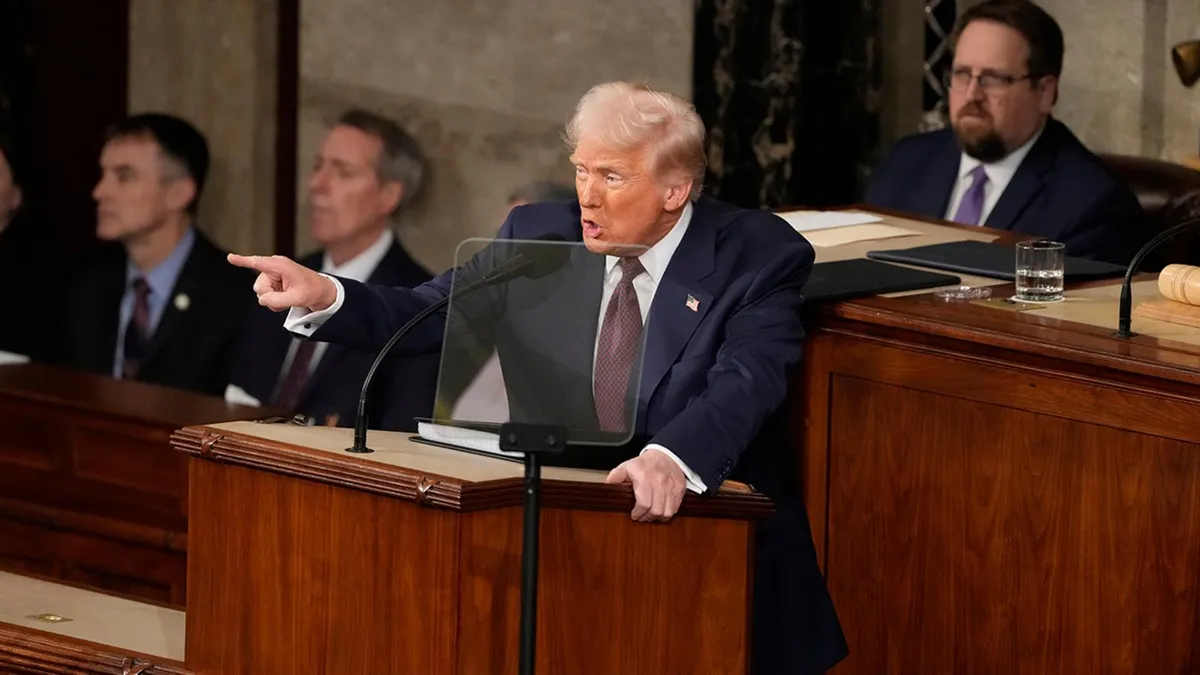
In a highly anticipated address to Congress and the nation, President Donald Trump outlined his goals for the next four years. This event, occurring six weeks into his presidency, was met with excitement, with Trump describing it as a "big night." House Speaker Mike Johnson also hinted at "fireworks" during the speech. To ensure transparency and accountability, ABC News, alongside PolitiFact, provided live fact-checking of Trump's statements, scrutinizing claims that were exaggerated, required additional context, or were outright false.
One of Trump's claims was that Joe Biden allowed the price of eggs to skyrocket, asserting that his administration is working hard to reduce costs. However, this statement lacks context. While egg prices did indeed rise during Biden's presidency, they also surged under Trump's administration due to a devastating bird flu outbreak that caused the deaths of 136 million birds since 2022, according to the American Farm Bureau Federation. Prices jumped from $1.93 per dozen to $4.82 in 2022, primarily due to this outbreak. Although prices moderated, they reached a record high of $4.95 in January 2023, again attributed to the ongoing impact of bird flu.
Trump asserted that he won a clear mandate in the election. While he did secure victories in both the Electoral College and the popular vote, this claim is subjective. Trump's victory, notable as only the second Republican win in the popular vote since 1988, was significant but not a landslide when viewed through a historical lens. His narrow margins of victory in key battleground states do not reflect overwhelming support, as many counties experienced only slight shifts in voting patterns. Moreover, the Republican Party did not significantly gain ground in congressional seats, losing some in the House while flipping the Senate.
Trump claimed he ended an "insane electric vehicle mandate" imposed by the previous administration. This statement is misleading; the Biden administration did not implement a mandate per se. Instead, they established tailpipe emissions standards for vehicles from model years 2027 to 2032. These standards allowed for various technologies, including electric cars and hybrids. Trump himself rescinded these standards through an executive order on his first day in office.
Another statement made by Trump was that the Paris Climate Accord was costing the U.S. trillions of dollars. This assertion is inaccurate. The basis for Trump's withdrawal from the agreement relied on projections that suggested potential job losses and economic downturns due to emissions restrictions. However, the long-term economic impact of the climate accord includes potential job gains and GDP growth associated with a transition to clean technology.
Trump also mentioned that Elon Musk discovered individuals aged 369 in the Social Security database. This claim is misleading. Musk's characterization stemmed from a chart indicating that some records for people over 100 lacked accurate death dates. The acting Social Security commissioner clarified that this does not imply fraudulent benefits are being paid to individuals of implausible ages.
In discussing immigration, Trump claimed he could create a "gold card" program for legal permanent residency without congressional approval. This assertion is misleading, as experts indicate that any new immigration program would require legislative action. Trump's plan, which involves a $5 million fee for permanent residency, lacks formal documentation and clarity regarding its implementation.
Trump's statement regarding DOGE uncovering hundreds of billions in fraud is also unverifiable. While DOGE claims substantial savings in federal spending, the figure of $106 billion is not corroborated by specific instances of fraud, with Musk himself indicating that most findings relate to waste rather than fraud.
Trump's assertion that tariffs would cause only a "little disturbance" for Americans is misleading. According to the Yale Budget Lab, these tariffs could cost households up to $2,000 annually. Tariffs on cars and parts are expected to increase vehicle prices significantly, contributing to inflation across various consumer goods.
On the topic of autism, Trump claimed that the prevalence of autism has dramatically increased from 1 in 10,000 children to 1 in 36. While he is correct about the current statistic, the origin of the 1 in 10,000 figure is unclear. Experts agree that while the rates of autism diagnoses have risen, it's important to maintain context regarding data collection and reporting over the years.
Lastly, Trump stated that Mexican authorities handed over 29 cartel leaders due to imposed tariffs. This claim is accurate; these extraditions coincided with negotiations surrounding tariffs and reflect a complex relationship between U.S. and Mexican authorities aimed at addressing national security concerns.
As Trump's presidency progresses, it remains essential for the public to critically evaluate the statements made by political leaders and seek out reliable fact-checking sources to comprehend the context and accuracy of their claims.